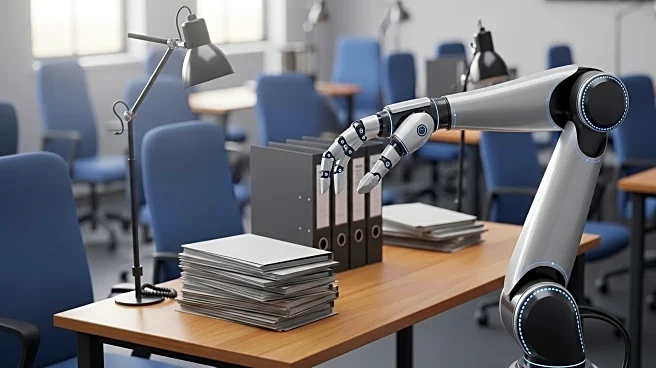What's Happening?
Acrisure, a prominent insurance broker based in Grand Rapids, Michigan, has announced plans to lay off 400 employees from its accounting workforce starting in early 2026. The decision is attributed to advancements in technology and artificial intelligence (AI), which the company believes are necessary to maintain competitiveness and meet client expectations. Acrisure, which employs around 2,000 workers in Michigan, is ranked third on Insurance Journal's 2025 Top 100 independent property/casualty agencies, with reported revenue of $2.83 billion in 2024. The company has been integrating AI into its operations since acquiring Tulco LLC's insurance intelligence business in 2020, a deal valued at approximately $400 million. This acquisition aimed to enhance product development and insurance sales and marketing through AI capabilities.
Why It's Important?
The layoffs at Acrisure highlight the growing impact of AI and technological advancements on the workforce, particularly in the insurance industry. As companies increasingly adopt AI to streamline operations and improve efficiency, there is a significant shift in employment dynamics, potentially leading to job losses in traditional roles. This development underscores the need for workers to adapt to changing technologies and acquire new skills to remain relevant in the evolving job market. For Acrisure, the integration of AI is part of a broader strategy to position itself as a tech-enabled financial services platform, which could enhance its competitive edge and drive future growth. However, the layoffs may also affect employee morale and community relations, given the company's substantial presence in Michigan.
What's Next?
Acrisure's decision to lay off employees due to AI integration may prompt other companies in the insurance sector to evaluate their own technological strategies and workforce needs. As AI continues to evolve, businesses might increasingly rely on automation, potentially leading to further workforce reductions. Acrisure's commitment to remaining competitive suggests ongoing investments in technology and strategic mergers and acquisitions, as evidenced by its recent $2.1 billion funding announcement. The company may focus on expanding its tech capabilities and exploring new markets to leverage AI-driven innovations. Stakeholders, including employees and industry observers, will likely monitor Acrisure's adaptation to technological changes and its impact on the insurance landscape.
Beyond the Headlines
The integration of AI in Acrisure's operations raises ethical considerations regarding workforce displacement and the responsibility of companies to support affected employees. As AI reshapes industries, there is a growing need for policies that address the social implications of technological advancements, including retraining programs and job transition support. The insurance sector, traditionally reliant on human expertise, faces challenges in balancing technological efficiency with maintaining personalized client interactions. Acrisure's approach may influence industry standards and prompt discussions on the role of AI in shaping future business models.









